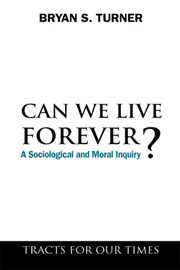Book contents
- Frontmatter
- Contents
- Acknowledgements
- Can We Live Forever?
- Chapter One Longevity and the Population Debate
- Chapter Two The Social Utopia of Human Perfection
- Chapter Three Ancient and Modern Techniques of Longevity
- Chapter Four The Political Economy of Ageing
- Chapter Five The Moral and Spiritual Character of Old Age
- Chapter Six Vulnerability and the Ethic of Care
- Chapter Seven Towards a New Paradigm of Ageing
- Chapter Eight The Aesthetics of Ageing
- Bibliography
- Index
Chapter Five - The Moral and Spiritual Character of Old Age
Published online by Cambridge University Press: 05 March 2012
- Frontmatter
- Contents
- Acknowledgements
- Can We Live Forever?
- Chapter One Longevity and the Population Debate
- Chapter Two The Social Utopia of Human Perfection
- Chapter Three Ancient and Modern Techniques of Longevity
- Chapter Four The Political Economy of Ageing
- Chapter Five The Moral and Spiritual Character of Old Age
- Chapter Six Vulnerability and the Ethic of Care
- Chapter Seven Towards a New Paradigm of Ageing
- Chapter Eight The Aesthetics of Ageing
- Bibliography
- Index
Summary
To-morrow, and to-morrow, and to-morrow,
Creeps in this petty pace from day to day
To the last syllable of recorded time,
And all our yesterdays have lighted fools
The way to dusty death. Out, out, brief candle!
Life's but a walking shadow, a poor player
That struts and frets his hour upon the stage
And then is heard no more: it is a tale
Told by an idiot, full of sound and fury,
Signifying nothing.
— Shakespeare, Macbeth, 5:5Introduction: The Reward-Punishment Model
In traditional societies (by which I mean preindustrial societies in which religious notions were still authoritative, dominant cultural forms and where customary behaviour or ‘morals’ contained a strong component of psychological and social threat), good conduct on this earth was to be rewarded either by some form of life after death or by a beneficial release from the suffering of this world. By contrast, transgression of customary norms was threatened by eternal punishment, damnation or a miserable and indeterminate existence as a ghost or, literally, as a lost soul. There was a strong element of resentment in these conformity–reward moral systems in which the rich, who were seen to be proud and haughty, would suffer extreme miseries cheered on by the erstwhile poor. This spiritual resentment was expressed in the biblical maxim that it is more difficult for a rich man to enter heaven than for a camel to pass through the eye of a needle.
- Type
- Chapter
- Information
- Can We Live Forever?A Sociological and Moral Inquiry, pp. 89 - 106Publisher: Anthem PressPrint publication year: 2009



